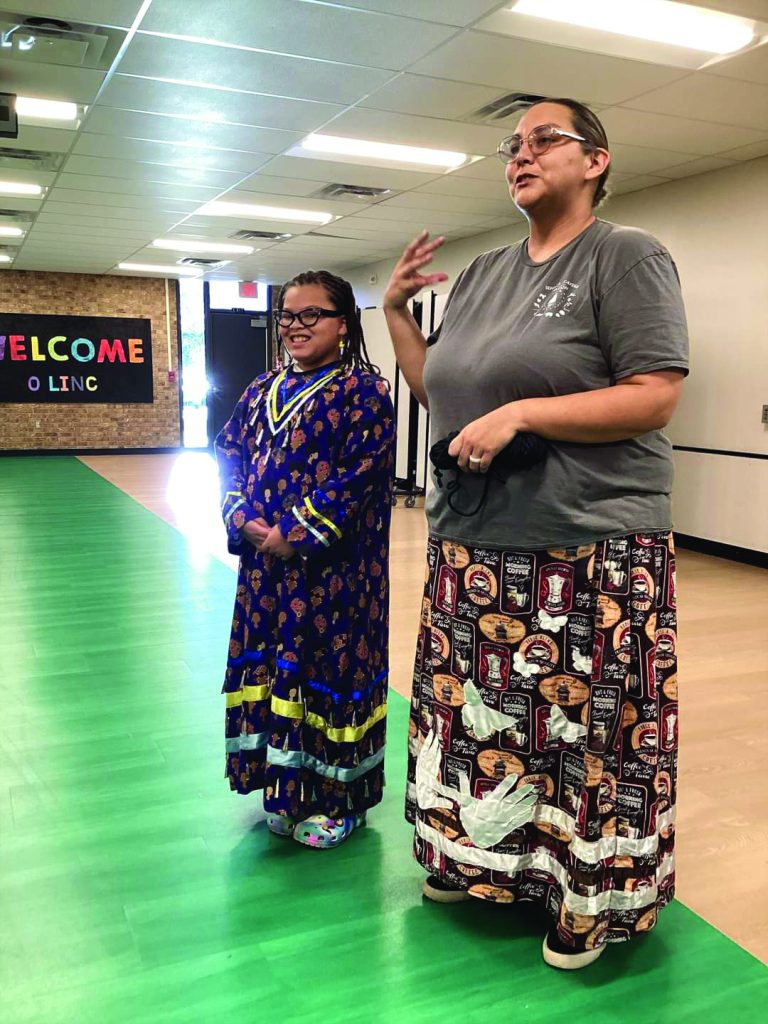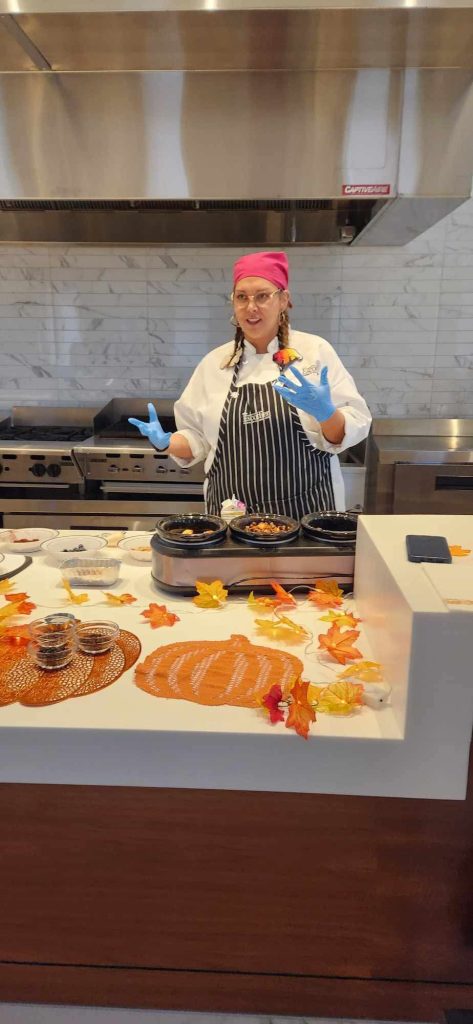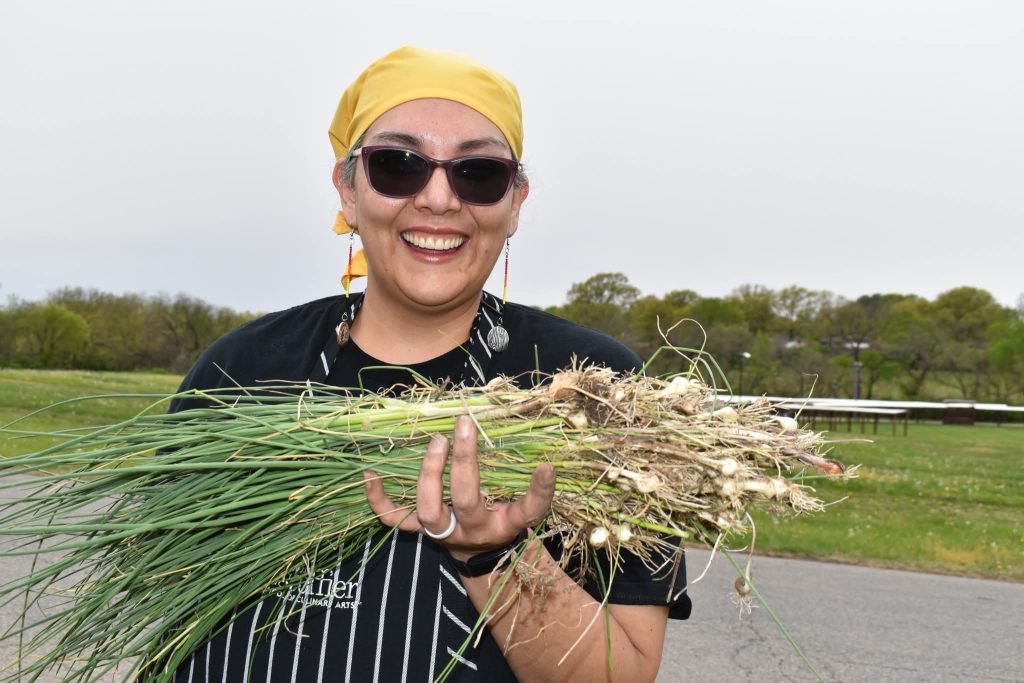Across the country, many Native people live far from their ancestral homelands, with limited access to traditional foods, language, and ceremony. For many families, food remains the easiest way to stay connected to heritage. As founder of Wadulisi’s Indigenous Foods and The Hive, Cherokee chef and entrepreneur Melissa Garrett leads programs that share the stories behind Indigenous ingredients and underscore the importance of food sovereignty, ensuring access to culturally meaningful foods. In 2018, after emergency spine surgery left her unable to work, Melissa began baking and catering small events. What started as a recovery project soon became a calling. “They wanted to know if I knew how to cook traditional foods, and I said, ‘Well, yes, I do’.” From those early requests, Wadulisi’s Indigenous Foods was born. The name Wadulisi means “honeybee” in Cherokee. It is a fitting symbol for a business built on hard work and community.

In the kitchen, Melissa honors her family’s history. “Every time I cook, I wear a ribbon skirt, if I can,” she said. “When we walked the trail, we hid the seeds of the beans, corn, and squash in our ribbon skirts so when we got to where we were going, we would have the food we were familiar with.” Through her business and non profit, Melissa creates contemporary versions of traditional dishes that blend original recipes with familiar ingredients to help younger generations connect with their heritage. She teaches the origins of fry bread, which her grandmother called “resiliency bread,” and the story of the “Three Sisters” — corn, beans, and squash — symbols of cooperation and community. “She used to talk about where fry bread came from and that it wasn’t necessarily born from a good place, but we made it a good thing,” she said. “It was made from when they told us we couldn’t forage and hunt anymore, so they put in rations. A lot of times it would be rancid lard and flour with weevils in it, so they had to find a way to cook that out and still make it something they could eat.” Melissa’s culinary outreach also includes public classes through the Kansas City Museum, where she teaches contemporary versions of traditional dishes, such as the traditional Lakota berry dish known as Wojapi. “I will add in raspberries, blackberries, strawberries, cherries, and some elderberries to make it a high antioxidant mix,” she said. “We pour the Wojapi over cornbread and add chamomile flowers on top.”

Upon losing her father and other members of her family between 2019 and 2021, her venture shifted again. Remembering her father, she said, “My dad was talking about how much culture we were losing, both in community and in our family, and how he felt like things were kind of just slipping through. He said, ‘Just don’t let them lose their culture.’” Those words led to the launch of The Hive in March 2023. It is a non profit focused on food sovereignty, cultural preservation, and education, guided by the seven sacred teachings. The seven sacred teachings in Indigenous culture are love, respect, bravery, honesty, wisdom, humility, and truth. These teachings, also known as the Seven Grandfather Teachings, are fundamental principles that guide how people should live and interact with one another and the world around them. The Hive’s mission focuses on preserving Indigenous culture, especially for those in cities who have fewer opportunities to connect with traditional foods and practices. “More than 81 percent of Indigenous people live off reservation,” Melissa said. “So we really are losing culture in our urban cores because we don’t have as much access to it.” In addition, Melissa has expanded The Hive’s impact to include digital education.

The website, launched on Indigenous Peoples Day, offers ready-to-use, grade-level materials created after listening to teachers who lacked time to build culturally relevant lessons. The idea came after Melissa’s daughter experienced racial bullying at school. That experience led her to develop different class materials. Her collaborations include a program designed for Washburn University called, From Stereotypes to Sovereignty. “We talked about how Natives have been impacted by stereotypes for a really long time through media and all kinds of things,” Melissa said. Her efforts have also earned local recognition, including a feature on PBS, and have sparked collaborations with Indigenous growers and organizations such as the Native Lands Restoration Collaborative. “They gave me all of these wonderful ingredients like prickly pear paddles, native beans, and chokeberries,” she said. “We worked a lot at trying to take traditional ingredients and blend them in a modern way.” Currently, Melissa plans to expand access to healthy foods across Kansas City. “It’s not fully solidified, but we are hoping to have gardens where we have Indigenous plants growing.” The gardens would include a mix of common produce and Indigenous ingredients, such as Cherokee tan pumpkins, tobacco, and sweetgrass. Melissa also has plans to distribute hydroponic growing kits to families.

The goal is to make it easier to grow fresh herbs and vegetables at home. “If you have fresh herbs, you’re more likely to get in the kitchen and cook instead of having more processed foods,” she said. “Even if it’s a small kit that sits on their counter, I think that’s good for everybody’s mental health, having something green and growing on your table.” For Melissa, each project, whether a classroom lesson, a community garden, or a shared meal, is part of a larger goal: helping people reconnect with their roots and their health. “We really need to find a way to access culture,” she said. “If you have no connection, how do you plug in?” Melissa is helping people answer that question through food, with one class, one garden, and one shared story at a time.

Featured in the November 15, 2025 issue of The Independent
By: Monica V. Reynolds